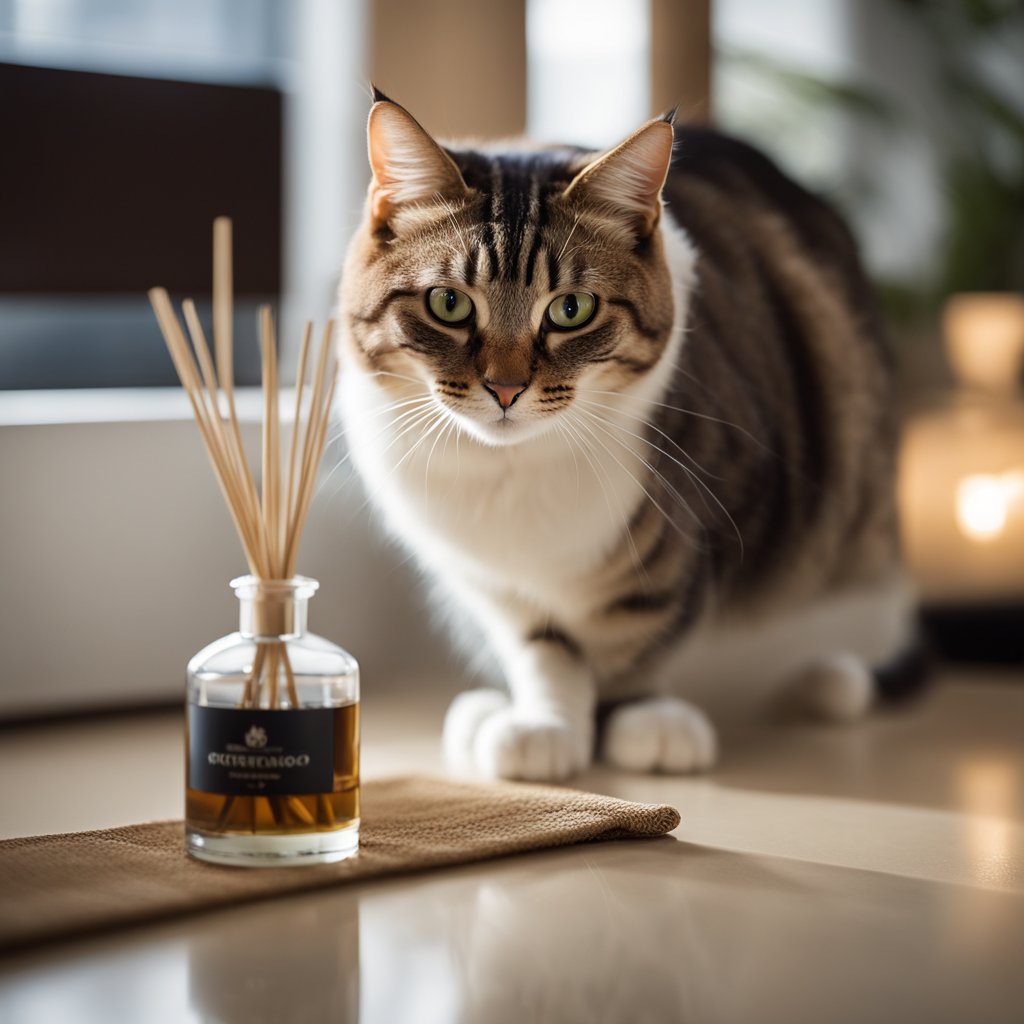Reed diffusers are a popular way to add fragrance to a room without the use of candles or sprays. However, many cat owners wonder if these diffusers are safe for their furry friends. The answer is not straightforward, as it depends on the specific ingredients used in the diffuser and the individual cat's sensitivity to certain scents.

Some reed diffusers contain essential oils that can be toxic to cats if ingested or inhaled in large quantities. These oils include tea tree, peppermint, eucalyptus, and citrus oils. Cats are particularly sensitive to these oils due to their liver's inability to break down certain compounds found in essential oils. Ingesting or inhaling these oils can cause symptoms such as vomiting, diarrhea, difficulty breathing, and even liver damage.
It's important for cat owners to carefully read the ingredients list on reed diffusers and avoid any that contain toxic oils. Additionally, it's recommended to place the diffuser in a well-ventilated area where the cat cannot easily access it. While reed diffusers can be a safe and effective way to add fragrance to a room, it's crucial to prioritize the safety and well-being of our furry companions.
What Are Reed Diffusers

Reed diffusers are a type of fragrance diffuser that uses reeds to disperse scented oil into the air. They consist of a glass or ceramic container filled with scented oil and several reeds inserted into the oil. The reeds absorb the oil and release the fragrance into the air.
Reed diffusers are a popular alternative to candles and other types of air fresheners because they require no heat or electricity to operate. They are also relatively low-maintenance, as the oil can last for several months and the reeds only need to be flipped occasionally to refresh the scent.
Reed diffusers come in a variety of scents and styles, making them a versatile and customizable option for home fragrance. However, it is important to note that not all reed diffusers are created equal, and some may contain ingredients that could be harmful to pets, particularly cats.
When selecting a reed diffuser, it is important to read the label carefully and choose a product that is free of toxic ingredients. Additionally, it is recommended to keep reed diffusers out of reach of pets, particularly cats, to prevent accidental ingestion or exposure.
Potential Harmful Effects on Cats
Reed diffusers are a popular way to add fragrance to a room, but they may pose a risk to cats. Here are some potential harmful effects of reed diffusers on cats:
1. Essential oils can be toxic to cats
Many reed diffusers contain essential oils, which can be toxic to cats if ingested or absorbed through the skin. Cats are particularly sensitive to essential oils because they lack certain liver enzymes that help to break down and eliminate these compounds from their bodies.
2. Respiratory problems
The strong fragrance from reed diffusers can irritate a cat's respiratory system, leading to coughing, sneezing, and difficulty breathing. This can be especially problematic for cats with pre-existing respiratory conditions such as asthma.
3. Skin irritation
Cats may also experience skin irritation if they come into contact with the reed diffuser oil. This can cause redness, itching, and inflammation, particularly in areas where the cat has licked or groomed itself.
It is important to keep reed diffusers out of reach of cats and to monitor them closely if you do use them in your home. If you notice any signs of toxicity or adverse reactions, such as vomiting, diarrhea, or lethargy, contact your veterinarian immediately.
Common Toxic Substances in Reed Diffusers
Reed diffusers have become popular for their ability to provide a pleasant aroma to a room without the use of electricity or an open flame. However, certain reed diffusers may contain toxic substances that can be harmful to cats. Here are some common toxic substances found in reed diffusers:
-
Essential oils: Essential oils are often used in reed diffusers to provide a pleasant scent. However, some essential oils can be toxic to cats. For example, tea tree oil, eucalyptus oil, and peppermint oil can cause vomiting, diarrhea, and even liver damage in cats.
-
Synthetic fragrances: Synthetic fragrances are often used in reed diffusers as a cheaper alternative to essential oils. However, these fragrances can contain chemicals such as phthalates, which have been linked to respiratory problems, hormonal disruptions, and even cancer in humans and animals.
-
Alcohol: Alcohol is often used as a carrier for the fragrance in reed diffusers. However, if a cat ingests the alcohol, it can cause alcohol poisoning, which can be fatal.
It is important to carefully read the label and ingredients of any reed diffuser before using it in a household with cats. If any of the above substances are listed, it is best to avoid using the reed diffuser altogether to ensure the safety of the cats in the household.
Signs of Reed Diffuser Poisoning in Cats
Reed diffusers are a popular way to freshen up a room, but they can pose a hazard to cats. If a cat ingests the liquid or comes into contact with it, it can lead to poisoning. Here are some signs of reed diffuser poisoning in cats:
- Vomiting: If a cat has ingested the liquid, they may vomit frequently.
- Diarrhea: Diarrhea is another common symptom of reed diffuser poisoning in cats.
- Drooling: Excessive drooling is a sign that the cat may have ingested the liquid or inhaled the fumes.
- Lethargy: Cats who have been poisoned may become lethargic and weak.
- Difficulty Breathing: If a cat inhales the fumes, they may have difficulty breathing.
- Tremors: Tremors or seizures may occur in severe cases of poisoning.
If a cat displays any of these symptoms, it is important to seek veterinary care immediately. Treatment may include inducing vomiting, administering activated charcoal, or providing supportive care such as IV fluids.
To prevent reed diffuser poisoning in cats, it is important to keep them out of reach and to use caution when handling the liquid. Consider using alternative methods to freshen up a room such as essential oil diffusers or natural air fresheners.
What to Do If Your Cat Is Exposed
If your cat is exposed to a reed diffuser, it is important to take immediate action to minimize any potential harm. Here are some steps you can take:
-
Remove the diffuser: The first step is to remove the diffuser from the room and place it in a safe location where your cat cannot access it. This will prevent further exposure.
-
Ventilate the room: Open windows and doors to increase air circulation in the room where the diffuser was located. This will help to dissipate any lingering fragrance and reduce the concentration of essential oils in the air.
-
Observe your cat: Watch your cat closely for any signs of distress or discomfort. Symptoms of essential oil toxicity in cats may include vomiting, diarrhea, difficulty breathing, tremors, and seizures.
-
Contact your veterinarian: If you suspect that your cat has been exposed to essential oils, it is important to contact your veterinarian immediately. They can provide guidance on how to proceed and may recommend treatment to reduce any potential harm.
Remember, prevention is the best approach when it comes to protecting your cat from potential hazards. Keep reed diffusers and other essential oil products out of reach of your pets, and always use them in well-ventilated areas.
Safe Alternatives to Reed Diffusers
For cat owners who are concerned about the safety of reed diffusers, there are a few alternatives that can be used to keep their homes smelling fresh without putting their feline friends at risk.
-
Essential Oil Diffusers: Essential oil diffusers are a great alternative to reed diffusers as they do not contain any harmful chemicals. They work by diffusing essential oils into the air, which can provide a natural and calming scent. However, it is important to note that not all essential oils are safe for cats, so it is recommended to do some research before using them.
-
Beeswax Candles: Beeswax candles are another safe alternative to reed diffusers. They are made from natural ingredients and do not produce harmful chemicals when burned. Additionally, they can provide a warm and cozy atmosphere in any room.
-
Fresh Flowers: Fresh flowers can also be used to add a natural and pleasant scent to a room. They not only provide a lovely fragrance but also add a pop of color and beauty to any space. However, it is important to note that some flowers can be toxic to cats, so it is recommended to do some research before bringing them into the home.
By using these safe alternatives, cat owners can enjoy a fresh and pleasant smelling home without compromising the health and safety of their furry friends.
Conclusion
In conclusion, while reed diffusers can be a great way to freshen up a room, it's important to be aware of the potential risks they pose to cats. Cats are sensitive to essential oils, and certain oils can be toxic to them.
If you choose to use a reed diffuser in your home with cats, it's important to take precautions such as keeping the diffuser out of reach from the cat, ensuring that the room is well-ventilated, and monitoring your cat for any signs of discomfort or illness.
Ultimately, the safety of your cat should be the top priority, and if you have any doubts or concerns about using a reed diffuser in your home, it's best to err on the side of caution and avoid using them altogether.

